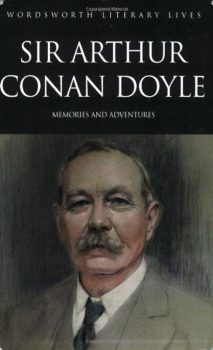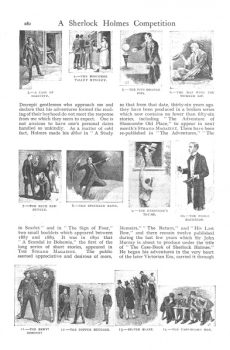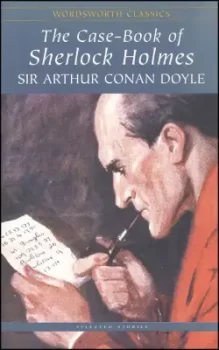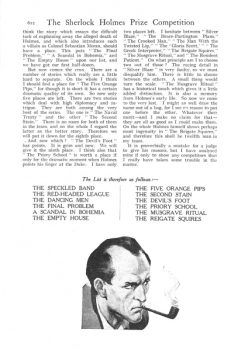The Public Life of Sherlock Holmes: Doyle’s Favorite SH Adventure (Doyle on Holmes)
 And it’s another essay by Arthur Conan Doyle about his famous detective. This was also the last one he wrote, appearing in The Strand in March of 1927.
And it’s another essay by Arthur Conan Doyle about his famous detective. This was also the last one he wrote, appearing in The Strand in March of 1927.
The fifth and final short story collection, The Casebook of Sherlock Holmes, was due out shortly.
He wrote a piece to announce a contest for readers of The Strand to name their twelve favorite Holmes stories. He would make his own list and see how they compared. The response with the closest list to his would win a $100 check and an autographed copy of his autobiography, Memories and Adventures. One hundred more people would win autographed copies of the autobiography (no check).
There are actually four components to this. The announcement, written by someone at The Strand, was A Sherlock Holmes Competition.
Doyle’s accompanying essay was Mr. Sherlock Holmes to His Readers.
In June, someone at The Strand wrote The Sherlock Holmes Prize Competition: The Result.
Which was accompanied by Doyle’s essay, How I Made My List.
So Doyle wrote an essay to announce the contest, and another a few months later, to name his favorite stories. Each of those two essays was accompanied by some in-house text, with its own title.
Clear as mud? Okay, let’s go!
A SHERLOCK HOLMES COMPETITION
£100 Cash Prize and 100 Autographed Copies of “Memories and Adventures”
In the following article Sir A. Conan Doyle makes the interesting announcement that from the forty-four Sherlock Holmes stories already published in book form in four volumes he has selected the twelve stories which he considers the best, and he now invites readers to do likewise. A sealed copy of this list is in the Editor’s possession, and a prize of £100 and an autographed copy of Sir A. Conan Doyle’s “Memories and Adventures” is offered to the sender of the coupon which coincides most nearly with this list. In the event of ties the prize of £100 will be divided. The actual order of the stories will not be regarded. Autographed topics of “Memories and Adventures” will also be awarded to 100 readers submitting the next nearly correct coupons.
An illustration from each of the stories is here given. Each illustration being numbered, competitors need only state on the coupon (which will be found on page 68 of the advertisement section) the numbers of the stories selected.
The four volumes of stories, “The Adventures of Sherlock Holmes,” “The Memoirs of Sherlock Holmes,” “The Return of Sherlock Holmes,” and “His Last Bow,” are published by Messrs. John Murray in two-shilling editions and may be obtained from all booksellers.
It was neat to include a Sidney Paget illustration for each story. So, readers could choose any twelve stories from the four collections issued so far.
It’s Elementary – The Case-book of Sherlock Holmes would be released (by Messrs. John Murray) three months later, in June.
Presumably there was a submission date on ‘the coupon’ that had to be returned, with the story choices. So, there you have the contest announcement.
SHERLOCK HOLMES TO HIS READERS
It’s not the most flattering opening:
“I fear that Mr. Sherlock Holmes may become like one of those popular tenors, who, having outlived their time, are still tempted to make repeated farewell bows to their indulgent audiences. This must cease and he must go the way of all flesh, material or imaginary.”
 Doyle was always content to trot Holmes out when he needed some money to chase fairies or support other spiritualist endeavors. But he never seemed to get over the annoyance that readers far more preferred Sherlock Holmes to his more ‘literary’ efforts. Even promoting this contest, he is a bit snarky, first thing.
Doyle was always content to trot Holmes out when he needed some money to chase fairies or support other spiritualist endeavors. But he never seemed to get over the annoyance that readers far more preferred Sherlock Holmes to his more ‘literary’ efforts. Even promoting this contest, he is a bit snarky, first thing.
Next he talks about ‘decrepit gentlemen’ who come up and tell him they read Holmes as a boy. Doyle is not flattered. Doyle often comes across as unpleasant, to me. Among the creations of my favorite books and stories, he’s not very high on my ‘likable’ list.
Then, he talks about the short stories having been collected in The Adventures, The Memoirs, The Return, and His LastBow. With the final ones about to be collected as The Case-Book of Sherlock Holmes.
He observes that Holmes began in “…the very heart of the Victorian Era. carried it through the all-too-short reign of Edward, and had managed to hold his own little niche in these feverish days.”
He notes that young men who read Holmes have seen their children grow up to do so as well, in the same magazine. “It is a striking example of the patience and loyalty of the British public.”
“I had fully determined at the conclusion of The Memoirs to bring Holmes to an end, as I felt that my literary energies should not be directed too much into one channel. That place, clear-cut face and loose-limbed figure were taking up an undue share of my imagination.
I did the deed, but fortunately, no coroner had pronounced up on the remains, and so, after a long interval, it was not difficult for me to respond to the flattering demand and to explain my rash act away. I have never regretted it, for I have not in actual practice found that these lighter sketches have prevented me from exploring and finding my limitations, in such varied branches of literature as history, poetry, historical novels, psychic research, and the drama.
Had Holmes never existed I could not have done more, though he may perhaps have stood a little in the way of the recognition of my more serious literate work.”
It’s Elementary – As I was reading this last quote, I was thinking that it’s as positive towards Holmes as doyle pretty much ever was. He finally stopped complaining that…and then he just can’t help himself. Nobody wants to read The Refugees, or Micah Clarke, instead of Sherlock Holmes. Holmes was his finest work, even though he denigrated its literary value. He reminds me of critics who looked down on Dashiell Hammett because it wasn’t literary. Get over it, Arthur.
I’ll explain why the next paragraph is of note:
“There has been some debate as to whether the Adventures of Holmes, or the narrative powers of Watson, declined with the passage of the years. When the same string is still harped upon, however cunningly one may vary the melody, there is still the danger of monotony. The mind of the reader is less fresh and responsive, which may unjustly prejudice him against the writer.
To compare things to small, Scott in his autobiographical notes has remarked that each of Voltaire’s later pamphlets was declared to be a declension from the last one and yet when the collected works were assembled they were found to be among the most brilliant. Scott was also deprecated by critics for some of his most solid work. Therefore, with such illustrious examples before one, let me preserve the hope that he who in days to come may read my series backwards will not find that his impressions are very different from those of his neighbor who reads them forwards.”
It’s Elementary – Doyle would remove the discussion of the contest and use this essay as the Preface to The Case-Book of Sherlock Holmes. Except he chose to delete the portion above. It’s unknown why he chose not to include that portion.
“It is as a little test of the opinion of the public that I inaugurate this small competition. I have drawn up a list of the twelve short stories contained in the four published volumes which I consider to be the best, and I should like to know to what extent my choice agrees with that of Strand readers. I have left my list in a sealed envelope with the Editor of The Strand Magazine.
And so, reader, farewell to Sherlock Holmes! I thank you for your constancy,l and can but hope that some return has been made in the shape of that destruction from the worries of life and stimulating change of thought which can only be found in the fairy kingdom of romance.”
THE SHERLOCK HOLMES PRIZE COMPETITION: THE RESULT
As before, there was some explanatory text, surely written by someone at The Strand, accompanying Doyle’s essay. It announced that Mr. R.T. Norman, of Wellingborough, Northans, had correctly named ten of the twelve stories selected by Doyle as the best.
Seven competitors correctly chose nine stories, and many got eight right. One hundred autographed copies of Doyle’s Memories and Adventures had been sent to the winners.
It’s Elementary – Passing on an autographed copy of his autobiography, won in a contest, would be a wonderful family tradition.
It was revealed that the first six stories on the list were being republished in The Grand Magazine, beginning in July. Doyle’s essay followed.
It’s Elementary – The Grand Magazine was a British pulp magazine, from The Strand’s owner, George Newnes. It ran from 1908 to 1940.
MY FAVOURITE SHERLOCK HOLMES ADVENTURES: HOW I MADE LIST
 Doyle opens by saying he thought it would be “the easiest thing in the world to pick out the twelve best of the Holmes stories.” But he found it to be a serious task, including reading the stories “with some care.”
Doyle opens by saying he thought it would be “the easiest thing in the world to pick out the twelve best of the Holmes stories.” But he found it to be a serious task, including reading the stories “with some care.”
He immediately ruled out the dozen most-recent stories, which had appeared in The Strand, but not yet collected. The contest was to promote John Murray’s forthcoming The Case-Book of Sherlock Holmes.
Clearly shilling the upcoming collection, Doyle says he would have included “The Lion’s Mane,” and “The Illustrious Client.”
“The Lion’s Mane” is more likely to be on a ‘Worst of’ list, rather than a ‘Best of.’ Doyle says of it, “…the actual plot is among the very best of the whole series,and for that it deserves its place.” Well, he’s certainly entitled to his own opinion.
“Illustrious Client” is certainly worth considering, at least. Baron Gruner is certainly a true villain. Doyle said the story was “…not remarkable for its plot, but it has a certain dramatic quality and moves adequately in lofty circles…”
Having disposed of the Case-Book stories, he moves on to his actual list.
“There is a grim snake story, ‘The Speckled Band.’ That I am sure will be on every list.”
It’s Elementary – I’ve written about the story here, the play here, and the movie here.
“Next to that in popular favour and in my own esteem I would place ‘The Red-Headed League’ and ‘The Dancing Men’ on account in each case of the originality of the plot.”
“Then we could hardly leave out the story which deals with the only foe who ever really extended Holmes, and which deceived the public (and Watson) into the erroneous inference of his death. Also, I think the first story of all should go in, as it opened the path for the other, and as it has more female interest than is usual.”
Finally, I think the story which essays the difficult task of explaining away the alleged death of Holmes, and which also introduces such a villain as Colonel Sebasian Moran, should have a place. This puts ‘The Final Problem,’ ‘A Scandal in Bohemia.’ and ‘The Empty House’ upon our list, and we have got our first half-dozen.
It’ s Elementary – I don’t think too many folks would argue about the first six stories chosen. These are definitely among the best of the Canon.
But now comes the crux. There are a number of stories which really are a little hard to separate. On the whole I think I should find a place or ‘The Five Orange Pips,’ for though it is short it has a certain dramatic quality of its own.
So now only five places are left. Here are two stories which deal with high diplomacy and intrigue. They are both among the very best of the series. The one is ‘The Naval Treaty,’ and the other ‘The Second Stain.’ There is no room for both of them in the team, and on the whole I regard the latter as the better story. Therefore, we will put it down for the eighth place.
And now which? ‘The Devil’s Foot’ has its points. It is grim and new. We will give it the ninth place. I think also that ‘The Priory School’ is worth a place if only for the dramatic moment when Holmes points his finger at the Duke.
I have only two places left. I hesitate between ‘Silver Blaze,’ ‘The Bruce-Partington Plans,’ ‘The Crooked Man,’ ‘The Man with the Twisted Lip,’ ‘The Gloria Scott.’ ‘The Greek Interpreter,’ ‘The Reigate Squires.’ ‘The Musgrave Ritual,’ and ‘The Resident Patient.’
On what principle am I to choose two out of those? The racing detail in ‘Silver Blaze’ is very faulty, so we must disqualify him.
There is little to choose between the others. A small thing would turn the scale. ‘The Musgrave Ritual’ has a historical touch which gives it a little added distinction. It is also a memory from Holmes’ early life.
So now we come to the very last. I might as well draw the name out of a bag, for I see no reason to put one before another. Whatever their merit – I make no claim for that – they are all as good as I could make them. On the whole, Holmes himself shows perhaps the most ingenuity in ‘The Reigate Squires,’ and therefore this shall be the twelfth man in my team.
It is proverbially a mistake for a judge to give his reasons, but I have analysed mine if only to show any competitors that I really have taken some trouble in the matter.”
 The list is therefore as follows:
The list is therefore as follows:
The Speckled Band
The Red-Headed League
The Dancing Men
The Final Problem
A Scandal in Bohemia
The Empty House
The Five Orange Pips
The Second Stain
The Devil’s Foot
The Priory School
The Musgrave Ritual
The Reigate Squires
This would be Doyle’s final writing on Holmes. It’s a pretty good list.
DOYLE ON HOLMES
Some Truths About Sherlock Holmes
Some Personalia About Sherlock Holmes
A Gaudy Death
The Case of the Inferior Sleuth

Bob Byrne’s ‘A (Black) Gat in the Hand’ made its Black Gate debut in 2018 and has returned every summer since.
His ‘The Public Life of Sherlock Holmes’ column ran every Monday morning at Black Gate from March, 2014 through March, 2017. And he irregularly posts on Rex Stout’s gargantuan detective in ‘Nero Wolfe’s Brownstone.’ He is a member of the Praed Street Irregulars, founded www.SolarPons.com (the only website dedicated to the ‘Sherlock Holmes of Praed Street’) and blogs about Holmes and other mystery matters at Almost Holmes.
He organized Black Gate’s award-nominated ‘Discovering Robert E. Howard’ series, as well as the award-winning ‘Hither Came Conan’ series. Which is now part of THE DEFINITIVE guide to Conan. He also organized 2023’s ‘Talking Tolkien.’
He has contributed stories to The MX Book of New Sherlock Holmes Stories – Parts III, IV, V, VI, XXI, and XXXIII.
He has written introductions for Steeger Books, and appeared in several magazines, including Black Mask, Sherlock Holmes Mystery Magazine, The Strand Magazine, and Sherlock Magazine.
I would have picked 7 out of Dr. Doyle’s list, maybe 8 if I went back to re-read “The Second Stain” and liked it enough. I would put “The Man with Twisted Lip” in the list, as I love the “twist” solution it has about the identity of the murderer and victim.
What do you think of Christie’s Poirot story, ‘The Disappearance of Mr. Davenheim’? Definitely similar to ‘The Twisted Lip.’
Ah, a reason to go and pull my copy of Poirot Investigates off the shelf! I would say that ‘The Disappearance of Mr. Davenheim’ has a similar vibe to Poe’s ‘Purloined Letter’ as well, with the idea of “hiding in plain sight”. And there is the amazing foreshadow of writing in 1923 about disappearances (including listing them by type – “Second, the much-abused ‘loss of memory’ case”) just before enacting one’s own disappearance as Ms. Christie did in 1926 for 11 days.